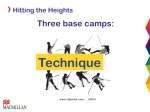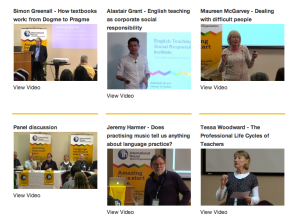Saturday May 1th 2014 saw me presenting a spanking new talk at MAC2014 – the annual Macmillan conference in Montevideo, hosted by the Anglo institute. It’s the third time I’ve talked at the Macmillan Montevideo conference and it was great to catch up with old friends and make some new ones.
The talk has been a long time in the making since it was inspired by Jeremy Harmer’s talk at the 2010 International House DoS Conference – ‘Speak the speech, I pray thee’, which discussed improving students’ fluency by helping them to think and prepare inside their heads first. It was an inspiring talk, but a little short on practical ways to get the students actually doing this in the classroom. So I set about trying to motivate and inspire my students to think much more in the class, alongside their development of the other four skills. It’s taken me a few years to put what I’ve done into a talk, since it’s very much a case of small steps and slowly, slowly catchy thinking student. As the Macmillan conference was focused on developing Life Skills, I thought this was the perfect opportunity to make myself write the talk and bring together my ideas on the topic.
The results are here, in the form of the slides for the talk in PDF:
and a video of them too:
as well as the video I used at the end as a way of having the students reflect on the ideas we discussed during the talk and think about how they could create more thinking space, structure and sensitivity into a lesson using this video. Unfortunately during the talk the sound was dodgy, so the great lyrics couldn’t be heard beyond the front row (and apologies to the audience that I had to resort to singing some of them myself!
I also hope to put a lesson together myself using this text as a launching ad, so look out for that here too!
Next up is the example text-based guided discovery lesson I used. You can read more about Guided Discovery and this lesson here if you’re interested.
And then here are some lesson ideas to use at the beginning of your efforts to inspire your students to think in English:
A reading based on a text about why to try and think in English when learning the language, with a worksheet that has built in space and structure for thinking.
Encourage your students to do some thinking for homework and then discuss what they’ve done in class – the flipped classroom turns your students flipping (if they talk to themselves 🙂 ).
Anecdote feedback sheet An example of how the students can reflect on each others’ work and tech each other a little more about anecdoting.










 In order to do this, we also need to focus our energies on high demand teaching and this is another key point that Jim & Adrian ask us – are we actually running away from the real teaching that needs to be going on in our classrooms? Are we afraid to get our hands dirty? Learning a language is a messy, difficult job and we need to be putting in the detailed ‘grimy’ work to get it done. The Communicative Approach in particular has led us (allowed us) to facilitate the students communicating, doing things (mechanically?), but are we getting involved enough in teaching forms and giving constructive feedback that ensures they are really making progress and improving step by step?
In order to do this, we also need to focus our energies on high demand teaching and this is another key point that Jim & Adrian ask us – are we actually running away from the real teaching that needs to be going on in our classrooms? Are we afraid to get our hands dirty? Learning a language is a messy, difficult job and we need to be putting in the detailed ‘grimy’ work to get it done. The Communicative Approach in particular has led us (allowed us) to facilitate the students communicating, doing things (mechanically?), but are we getting involved enough in teaching forms and giving constructive feedback that ensures they are really making progress and improving step by step?





































Day two at #iatefl from a downtown BsAs bus
10 04 2013Starting this on the bus on the way home from the centre of town,
The 39 bus – from Corrientes to Carranza
and no doubt won’t finish it til tomorrow morning, but wanted to try out making a post on my phone – after all, this is where our learners are headed, isn’t it?
Sandy has been a big help again today, easily my star of the conference.
‘We’ ‘saw’ the following talks together:
Does the word “synonym” have a synonym? – Leo Selivan
Bridging the gap by Ceri Jones
From preparation to preparedness – Adrian Underhill and Alan Maley
Does the word “synonym” have a synonym? – Leo Selivan
talk sounds fascinating, I love travelling back through the history of the language as he did at the beginning of his talk and this pie chart of the make up of English I haven’t seen before:
Where does English come from?
And for some strange reason I always enjoy telling my students that English is the biggest language in the world (for some other strange reason my Argentine students never believe me and insist Spanish has more words, not a problem I ever had in the Czech Republic).
And of course, the main point Leo makes about synonyms is crucial when it comes to vocab learning (well-timed, since I’m doing our CELTA session on teaching vocab this afternoon – one of my favourites) – synonyms are not the same. This is something I’m a staunch defender of and always pick up our trainees on when they say ‘they’re the same’ to the students in class (a little demand high CELTA tutoring there, Neil?). If they were the same then we wouldn’t have two words for something. The reason we do have two words for something, or three or four, is because there are subtle differences between them (perhaps because the different social or geographic classes saw things differently back when the language was being molded (hang on a minute, language is always being molded (although perhaps nowadays it’s being moulded too?)). And so they don;t differ in basic meaning, but as Leo points out, they differ in their collocations, register, colligations and semantic prosodies, to name but a few. And this does need to be pointed out to students, as I will point out to our CELTees this afternoon.
Sandy reports only two practical ideas from Leo, collocation forks, which if I understand correctly go back to Lewis’ ideas in The Lexical Approach, and a website called Just the word, which looks like a useful reference page for teachers and students alike – demand high of yourselves by checking out collocations of words before you teach them (but remember to stay in the context in which you’re teaching). My example nods to yesterday’s post about Day One at IATEFL:
http://www.just-the-word.com
I do like the visula simplicity of the little green bars, though I’m struggling to see why ‘cabbage at’ is just as used as ‘cabbage with’. Market forces I imagine.
Bridging the gap by Ceri Jones
is getting short shrift because I have some Academic Coordinating to do before pilates class, but seems worth a mention because the course book she is selling in the talk seems to be written on slightly more solid foundations than any others in recent years. It seems to take into account the changing world and changing language around us and tries to be more relevant to learners by including them more in activities. I imagine like most talks about course books she focused on the three best activities in the book, but hopefully that’s just me being cynical. Definitely one to check out when it comes to choosing new books. One activity she mentions that I am a big fan of is getting the learners to write a text before they read a similar text form the coursebook, they are then immediately comparing their own ideas and writing skills with those of the author, which makes the whole process more cognitive and affective.
From preparation to preparedness – Adrian Underhill and Alan Maley
This was one of the most eagerly awaited (and tweeted sessions) of the day and I picked up on the following:
This just made me want to be at the conference and at the session. Whether or not the presenters were giving us good ideas, I’d love to have been there to see them try.
And this tweet makes me want to read these articles. We should all be expecting the unexpected in our lessons – and enjoying it! One of the things I loved most about our recent Delta Intensive was watching very good teachers (when the lesson went to plan) become even better teachers by changing the plan, adapting the plan and losing the plan depending on their students’ needs.
But unfortunately there weren’t too many practical ideas coming out of the session, except for this list:
Training teachers to improvise
Improvising teachers
Those last two are the ones I’m going to focus on more, since the others are hopefully already ‘just good teaching’, aren’t they?
Time to coordinate, so I’ll leave you with a few random thoughts on a few random tweets I favourited throughout the day:
Completely agree with this one, Mike. I always try and set my self a new development goal each year (and normally manage many more along the way). This year’s include blogging IATEFL :), writing a Delta Module One Live Online course and celebrating IH World’s 60th anniversary (hope you enjoy the free gifts, since many of them are from me).
This tweet too sounds like the kind of session I enjoy – practical activities that really work in the classroom. How many were there? What were they? Do they really promote further fluency? How can I find out?
I include this tweet because I don’t really get it. Apart from people actually paying less attention to the speaker during conversations because they are distracted by their phones (although at conferences we probably concentrate more when we are tweeting / blogging during the talks?), speech itself isn’t changing, so how does the speaker envisage speaking activities reflect the more digital communication that there is? Anyone who was there care to enlighten me?
This link sounded good so I’m sharing it with you. Obviously I was intrigued by the Dogme / Demand High mix (’twas only a matter of time) so let’s see what it’s all about shall we? Not much D&D (un)fortunately, so little in fact I had to comment on it:
Hi Tom, .
.
Very common sense if your students have the technology – sounds just like my kind of lesson and similar to one I shared yesterday in its use of whatever tech is ‘handy’.
Am interested in hearing how you made it Demand High though, since that doesn’t come out of your post and those dominoes don’t sound very Dogme (not that that’s a criticism).
But I hope your title and tags brought you a few new readers like myself anyhow
https://twitter.com/harrisonmike/status/321662458794221569
I’m a big fan of Wily’s and would love to have been at his talk – he really is an authentic teacher and always makes you think. If I have time I’ll try and get more of a taste of his and Katy Davies’ talks to comment on tomorrow, because they sound like to of the talks of the day.
Work beckons. What do you reckon?
Comments : 8 Comments »
Tags: 2013, activities, Buenos Aires, CELTA, comment, CPD, Delta Modules, Demand High, Dogme, ELT, handout, IH, International House, lesson plans, Neil McMahon, Share, Speaking, Students, tweet, workshop
Categories : Developing Teachers, My CPD and I